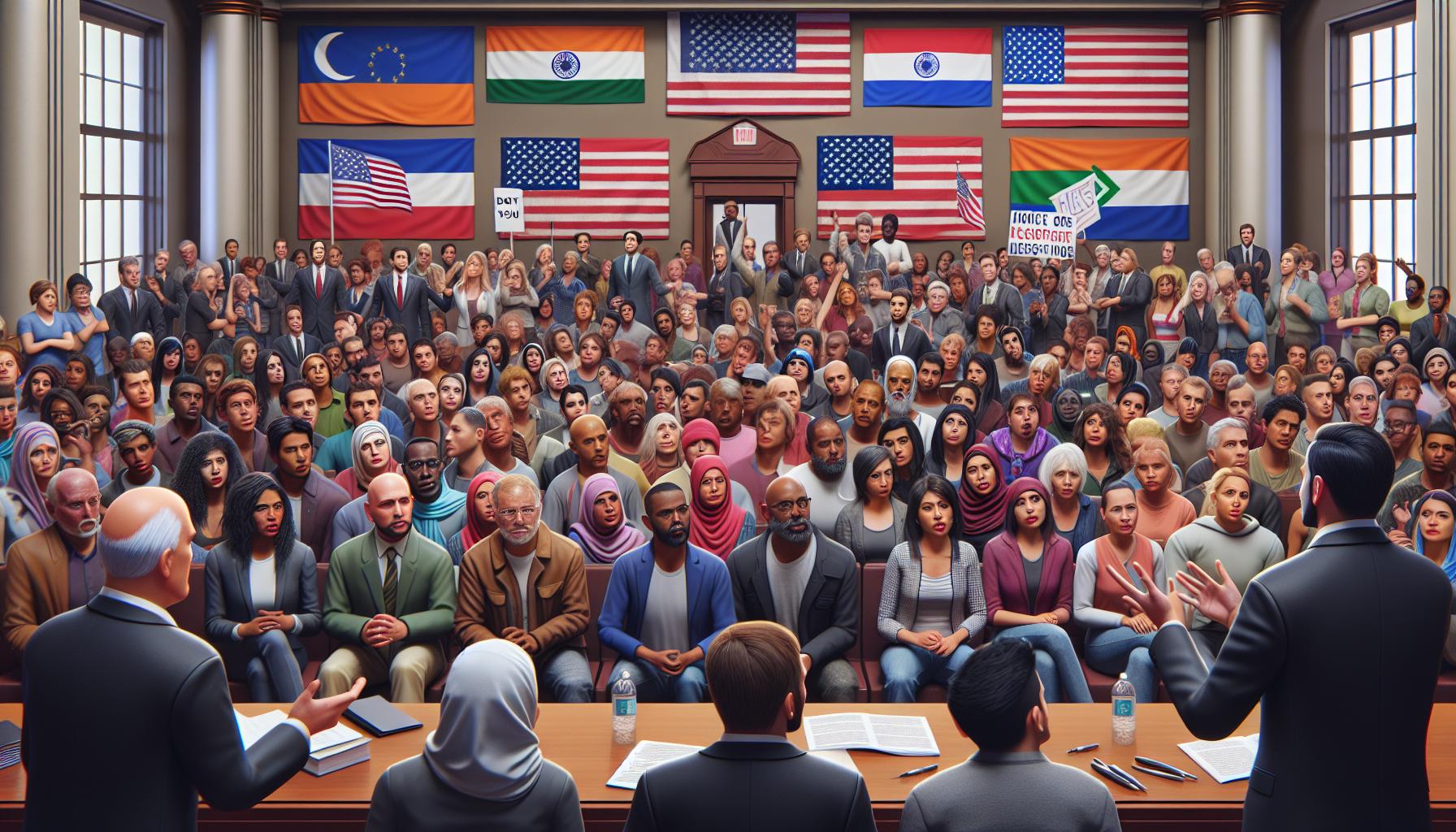
04 Mar What Happens if Trump Wins? Unveiling Global Shifts
As the political landscape braces for another potential Trump presidency, you’re likely wondering what it could mean for the nation and the world. A win for Trump would undoubtedly shake up both domestic and international policies, sparking debates and discussions across the globe. From economic strategies to foreign relations, the impact of his leadership could be far-reaching and complex.
You’re not alone in considering the implications of such an outcome. Supporters anticipate a return to policies that prioritize American interests, while critics fear increased polarization and unpredictability in governance. Understanding the potential consequences of a Trump victory is crucial as it could redefine the trajectory of key issues like immigration, healthcare, and climate change. As you explore these possibilities, it’s essential to stay informed and engaged with the evolving political dynamics.
Key Takeaways
- Economic Strategies and Market Reactions: A Trump victory could reshape fiscal and trade policies, leading to significant market volatility. Analysts predict possible fluctuations in investment patterns and crypto markets based on regulatory changes.
- Social and Political Shifts: Expect potential changes in immigration, healthcare, and social programs, including stricter immigration controls and healthcare reforms, reflecting Trump’s prior administration policies.
- Impact on Climate and Environmental Policies: Anticipated shifts favoring economic growth may involve increased fossil fuel production and less federal support for renewable energy, potentially affecting U.S. participation in international climate initiatives.
- Global Relations and Alliances: Foreign policy under Trump could test international alliances like NATO and intensify trade tensions, particularly with China, impacting global economic dynamics.
- Public Opinion and Potential Protests: A Trump victory might polarize public sentiment, leading to both enthusiastic support and significant protests, as citizens react to perceived changes in civil liberties and political direction.
The Potential Economic Impact
The potential impact of a Trump victory on the economy garners significant attention. Possible changes in fiscal and trade policies could affect market conditions and international economic relations.
Market Reactions and Predictions
Markets may react sharply to the uncertainty associated with policy changes. Analysts might anticipate increased volatility in equities, currencies, and commodities. Stocks could fluctuate based on perceived benefits or risks to certain industries, particularly those dependent on regulatory shifts or fiscal policy changes. Additionally, uncertainty around a Trump administration’s regulatory stance might influence investment patterns, with some sectors potentially experiencing growth while others face challenges.
One consideration involves cryptocurrency markets. Some speculate that established financial policies’ revisions could either bolster crypto assets or create temporary instability. Although it’s unclear if Trump’s presidency could directly cause a cryptocurrency surge, discussions around “Trump crypto plan” remain speculative. Therefore, whether cryptocurrencies like Bitcoin or niche assets such as Trump coin perform well remains unanswered.
Trade Policies and International Relations
Changes in trade policies might impact global economic dynamics. A focus on renegotiating international trade agreements could alter import-export balances, influencing domestic businesses reliant on foreign markets or supply chains. These modifications might benefit certain industries, but others could face increased tariffs or restrictions. For instance, manufacturing sectors could see shifts in production and pricing strategies.
Under a Trump administration, diplomatic and economic relations with key players such as China and the European Union might experience significant scrutiny. While supporters argue that these efforts protect American interests, critics point to possible retaliatory measures or strained international relationships as potential downsides. Examining past trade policy approaches helps assess likely outcomes, making it essential to consider historical data and expert opinions on these complex interactions.
Social and Political Changes

A potential Trump presidency could bring substantial shifts in social and political arenas, influencing both national sentiment and legislative agendas.
Immigration and Border Policies
Trump’s administration might prioritize stricter immigration controls, resembling previous strategies. Enhanced border security could mean the continuation or expansion of structures such as the border wall. Immigration policies may emphasize deportations and stringent vetting processes. The Deferred Action for Childhood Arrivals (DACA) program and other immigration initiatives could face reassessment, potentially affecting undocumented individuals and their families.
Healthcare and Social Programs
Changes in healthcare policy could lead to attempts to dismantle or revise the Affordable Care Act (ACA). A focus on privatization might arise, affecting Medicare and Medicaid structures. Social programs could shift towards work requirements or stricter eligibility criteria, influencing access to welfare. Supporters might argue for cost efficiency, while critics could raise concerns about coverage reduction.
Implications for Climate and Environmental Policies
A Trump presidency could lead to significant shifts in climate and environmental policies, affecting both national and international landscapes. His previous stance suggests potential changes that favor economic growth over environmental protection.
Energy Sector Changes
Trump’s energy policy might focus on increasing domestic energy production, particularly fossil fuels like oil, coal, and natural gas. Renewable energy sources, despite their environmental benefits, could receive less federal support. This shift could impact emission targets, potentially delaying or altering progress towards cleaner energy goals. Trump’s stance on rejoining the Paris Agreement would be pivotal, as withdrawal could hinder international collaboration on climate change initiatives.
Environmental Regulations
A Trump administration might prioritize economic growth by rolling back environmental regulations that businesses argue constrain profitability. This could include revisiting the Clean Air Act and Clean Water Act, leading to regulatory uncertainty. Agencies like the Environmental Protection Agency (EPA) may face changes in leadership and operational priorities. Stakeholders in industries reliant on environmental resources need to assess the potential regulatory landscape to adapt effectively.
These policy directions underscore the importance of monitoring legislative changes that influence not only environmental outcomes but also economic and social dimensions related to climate strategy.
Effects on Global Relations
A Trump victory could significantly impact global alliances and international relations, shaping geopolitical dynamics. Strategic recalibrations may surface as nations respond to American foreign policy shifts.
NATO and International Alliances
A Trump presidency might test NATO’s cohesion. Previous administrations under Trump questioned alliance commitments and urged European nations to increase their defense spending. Allies may prepare for pressure to enhance military contributions, affecting transatlantic relations. Trump’s leadership style could also bring unpredictability to diplomatic engagements, challenging existing partnerships and fostering new alignments. Nations might reassess strategic alliances, seeking stability amid changing policies.
US-China Relations
Tensions could intensify between the U.S. and China under a Trump administration. Trade relations may undergo further renegotiation, impacting tariffs and market access. Previous policies focused on protecting American jobs and industries by addressing trade imbalances. Continued emphasis on economic nationalism might lead to higher tariffs and stricter regulations on Chinese tech firms. These measures could provoke counteractions from China, influencing global economic conditions and business strategies. Diplomatic ties might experience heightened challenges as both nations assert global influence.
Public Response and Potential Protests
The prospect of a Trump victory could ignite diverse reactions across the nation. Citizens invested in the political landscape may exhibit powerful emotional responses, influencing public discourse and political sentiment.
Public Opinion and Voter Sentiment
Anticipate polarized views among voters if Trump wins, with supporters expressing enthusiasm and critics voicing concerns. Surveys from previous elections suggest that a segment of the population backs Trump’s agenda of prioritizing national interests. Conversely, others might worry about implications like social division or policy reversals, as seen in debates surrounding areas such as healthcare and immigration. Polls and discussions within communities could reflect these contrasting stances.
Potential for Civil Unrest
Historical trends indicate that significant political shifts often lead to protests, as observed during Trump’s previous term. Following his win, some groups rallied against perceived threats to civil liberties and democratic institutions. Protests might emerge in urban centers and regions with strong opposition, particularly in light of contentious issues like racial equality and environmental policies. While peaceful demonstrations are common, authorities might prepare for heightened tensions to ensure public safety.
Conclusion
As you contemplate the potential outcomes of a Trump presidency it’s crucial to weigh the diverse implications on various fronts. From domestic policy shifts to international relations the landscape could experience significant changes. Understanding these potential impacts will help you navigate the evolving political and economic environment with greater awareness. Stay informed and engaged as the situation develops to make well-rounded decisions that align with your values and interests.
Frequently Asked Questions
How might a Trump presidency affect domestic policies?
A Trump presidency could focus on American interests, potentially leading to stricter immigration controls, changes in healthcare policies, and revisions of social programs. While supporters argue these shifts can enhance national security and financial efficiency, critics warn about increased polarization, reduced welfare coverage, and potential challenges for undocumented individuals.
What are the potential economic impacts of a Trump victory?
A Trump victory could alter fiscal and trade policies, affecting markets through increased volatility in equities, currencies, and commodities. Changes might reshape global economic dynamics due to renegotiation of trade agreements, potentially impacting domestic businesses, international relations, and market conditions.
How could a Trump presidency influence climate and environmental policies?
Trump’s energy policy might prioritize fossil fuel production over renewable energy, potentially rolling back regulations like the Clean Air and Water Acts. These changes could delay progress towards clean energy goals and create regulatory uncertainty impacting industries reliant on environmental resources.
What global relations may be affected by a Trump presidency?
A Trump presidency could strain alliances such as NATO, possibly impacting its cohesion and urging increased defense spending by European members. Tensions with China might intensify, affecting trade negotiations, tariffs, and could lead to significant shifts in geopolitical dynamics and global economic conditions.
How might social and political landscapes change under a Trump presidency?
Significant shifts in national sentiment and legislative agendas could occur, with diverse public reactions influencing discourse and policy. Potential protests, similar to those during Trump’s previous term, could emerge over contentious issues like racial equality and environmental policies due to heightened social divisions.




Sorry, the comment form is closed at this time.